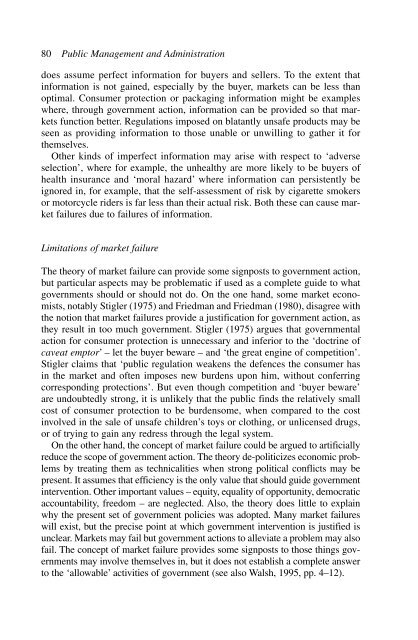Public Management and Administration - Owen E.hughes
Public Management and Administration - Owen E.hughes
Public Management and Administration - Owen E.hughes
Create successful ePaper yourself
Turn your PDF publications into a flip-book with our unique Google optimized e-Paper software.
80 <strong>Public</strong> <strong>Management</strong> <strong>and</strong> <strong>Administration</strong><br />
does assume perfect information for buyers <strong>and</strong> sellers. To the extent that<br />
information is not gained, especially by the buyer, markets can be less than<br />
optimal. Consumer protection or packaging information might be examples<br />
where, through government action, information can be provided so that markets<br />
function better. Regulations imposed on blatantly unsafe products may be<br />
seen as providing information to those unable or unwilling to gather it for<br />
themselves.<br />
Other kinds of imperfect information may arise with respect to ‘adverse<br />
selection’, where for example, the unhealthy are more likely to be buyers of<br />
health insurance <strong>and</strong> ‘moral hazard’ where information can persistently be<br />
ignored in, for example, that the self-assessment of risk by cigarette smokers<br />
or motorcycle riders is far less than their actual risk. Both these can cause market<br />
failures due to failures of information.<br />
Limitations of market failure<br />
The theory of market failure can provide some signposts to government action,<br />
but particular aspects may be problematic if used as a complete guide to what<br />
governments should or should not do. On the one h<strong>and</strong>, some market economists,<br />
notably Stigler (1975) <strong>and</strong> Friedman <strong>and</strong> Friedman (1980), disagree with<br />
the notion that market failures provide a justification for government action, as<br />
they result in too much government. Stigler (1975) argues that governmental<br />
action for consumer protection is unnecessary <strong>and</strong> inferior to the ‘doctrine of<br />
caveat emptor’ – let the buyer beware – <strong>and</strong> ‘the great engine of competition’.<br />
Stigler claims that ‘public regulation weakens the defences the consumer has<br />
in the market <strong>and</strong> often imposes new burdens upon him, without conferring<br />
corresponding protections’. But even though competition <strong>and</strong> ‘buyer beware’<br />
are undoubtedly strong, it is unlikely that the public finds the relatively small<br />
cost of consumer protection to be burdensome, when compared to the cost<br />
involved in the sale of unsafe children’s toys or clothing, or unlicensed drugs,<br />
or of trying to gain any redress through the legal system.<br />
On the other h<strong>and</strong>, the concept of market failure could be argued to artificially<br />
reduce the scope of government action. The theory de-politicizes economic problems<br />
by treating them as technicalities when strong political conflicts may be<br />
present. It assumes that efficiency is the only value that should guide government<br />
intervention. Other important values – equity, equality of opportunity, democratic<br />
accountability, freedom – are neglected. Also, the theory does little to explain<br />
why the present set of government policies was adopted. Many market failures<br />
will exist, but the precise point at which government intervention is justified is<br />
unclear. Markets may fail but government actions to alleviate a problem may also<br />
fail. The concept of market failure provides some signposts to those things governments<br />
may involve themselves in, but it does not establish a complete answer<br />
to the ‘allowable’ activities of government (see also Walsh, 1995, pp. 4–12).











